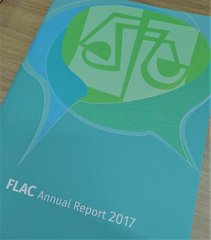25,817 received legal information and advice in 2017
11 September 2018

- Top queries: family law, employment law, wills/probate and housing
- 103 casefiles: housing, social welfare and discrimination
- Call for wider powers to be given to the Courts dealing with mortgage holders in deep arrears
- Call for legal aid to be available in housing cases, in proceedings involving repossession of the family home
A total of 25,817 people received legal advice last year from volunteer lawyers at legal advice clinics or legal information from FLAC’s Telephone Information and Referral Line. These figures were announced in FLAC’s 2017 Annual Report, launched today by Minister for Justice and Equality, Charlie Flanagan TD.
Speaking ahead of the launch, Minister Flanagan said “I am very pleased to launch FLAC’s annual report for 2017. It is a welcome opportunity to thank all the staff, volunteers and supporters who make its work possible. I also want to acknowledge the Citizens Information Services who work so closely with FLAC in those clinics.”
There were 12,003 calls to FLAC’s telephone helpline and the main queries related to, family law (25.9%), employment (9.9%) and housing (7.1%).
13,814 individuals received legal advice from volunteer lawyers at clinics run in conjunction with the Citizens Information Service at 66 locations nationwide. Family law (34.5%), employment (15.8%) and wills/probate (9.2%) were the most common legal queries.
110 social justice organisations received legal assistance through FLAC’s public interest law project PILA, by private practitioners acting pro bono. The impact of this work was evident in March 2017 in the judgment of the High Court in Sinnott V The Minister for the Environment which vindicated the right to a secret ballot for people with a visual impairment.
FLAC is an Independent Law Centre that takes on cases where this is in the public interest. In 2017 it had 103 casefiles, the most prevalent issues were housing /landlord and tenant (29%), social welfare (19%) and discrimination (16%).
In one of these cases, FLAC secured emergency accommodation on behalf of a seriously ill homeless man who had previously been denied emergency accommodation. FLAC acted in 8 eviction proceedings. It also represented tenants who were awarded substantial compensation for discrimination by the landlord on the housing assistance ground.
Housing issues were also prominent in FLAC’s policy work throughout 2017. FLAC made a detailed submission to the Department of Justice and Equality in relation to its review of the Personal Insolvency Act. For some time FLAC has been concerned about the position of mortgage holders in long-term arrears and has advocated for the need for Courts to have greater flexibility in these complex cases and a dedicated court/tribunal. FLAC believes that the recent sale of thousands of mortgages in arrears to ‘vulture funds’ exposes borrowers to a greater risk of losing their properties due to the uncertain nature of ‘vulture funds’.
Eilis Barry, FLAC Chief Executive stated “There is significant unmet legal need in relation to housing and homelessness. From a legal rights perspective, the following actions are urgently required:-
- Provide a clear basis in law for refusing to make an order for possession in the case of default involving the family home. FLAC has drafted and furnished to the Minister for Justice and Equality an amendment to section 101 of the Land and Conveyancing Law Reform Act, 2009.
- Implement the commitment in the programme for government to establish a dedicated court/ tribunal which can deal with problem mortgage arrears on a case-by-case basis with a view to proposing resolutions.
- Ensure that legal aid is available to people facing family home repossessions by financial institutions or local authorities. FLAC has provided a draft amendment to the Civil Legal Aid Act to the Department of Justice and Equality which if implemented will ensure that legal aid is available for families facing repossessions of their family homes. While the Abhaile voucher scheme is a welcomed step it does not go far enough.
- End the discriminatory reduced Social Welfare payments for under 26s and provide for equal treatment for under 26s in relation to Job Seekers Allowance and Supplementary Welfare Allowance, as the reduced payments increase the risk of homelessness and further marginalises those who are homeless.
These actions are required as a matter of urgency and given the complexity involved, work needs to begin immediately as a priority.”
Eilis Barry thanked the work of the volunteer lawyers, those who provide their expertise and time in the clinics, those on the PILA pro bono register and those who assist with FLAC’s case work. She thanked the staff in the Citizens Information Services and Citizens Information Board who facilitate and host the clinics. She also thanked all of FLAC’s donors and funders - philanthropic, Governments Departments, statutory bodies, the Law Society, the Bar Council, the law firms, solicitors and barristers who continue to make FLAC’s work possible.
Minister Flanagan added “Over 25,000 people received assistance in 2017; either via FLAC's telephone information line or through its 66 legal advice clinics countrywide. And I would also acknowledge the financial support provided to FLAC by other bodies including philanthropic donors, the Law Society, Bar Council and legal practitioners.”
/ENDS #FLACAnnualReport